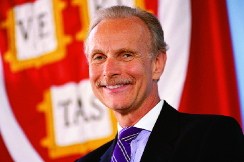"Ask me what College class I was in," says Harvard Alumni Association president Charles L. Brock, "and I have to admit I don't have any." He jokes about being a "minority" at the HAA because he earned his undergraduate degree from Northwestern University and has "only" a 1967 degree from Harvard Law School (HLS), where he has played multiple roles in alumni affairs, development, and fundraising for the last three decades. "Who would have thought the president of the HAA never went to the College?" Brock asks. "I make a joke of it, but I think it has symbolic value. Barely 30 percent of Harvard's alumni have attended the College. Connecting everyone and making them feel a part of the University, and feel that the HAA is their organization, is a very important and relatively new mission."
 |
| Charles L Brock |
| Photograph by Jim Harrison |
In the last few years, in lieu of its traditional College-only focus, the HAA has restructured its staff and goals to include that University-wide view. Brock applauds the effort and is organizing a series of unifying programs on leadership for the HAA directors' meetings this year. "Each of the schools has something valuable to contribute about how we choose leaders, how we admit them, how we train them, and how each part of the University views leadership."
Brock is no stranger to the subject himself. Soon after graduating from the law school, he became a class officer and in time served as the tenth-reunion-gift chair: his team raised more money than any previous HLS tenth-reunion class. He also founded the Harvard Law School Association of New York City's summer reception, which celebrated its twenty-first anniversary in July. In 1996, Brock was elected president of the Harvard Law School Association and oversaw the first-ever HLSA Worldwide Alumni Congress, held in Rome.
Brock's first involvement with the HAA came in 1990, when the Law School appointed him its representative on the HAA's board; within several years he became chairman of the graduate schools and the nominating committees. This year, he turns his attention to several HAA projects. They include finding a way to assess the methods and strategies used to connect with alumni, and creating policy guidelines for the HAA's involvement with burgeoning alumni "affinity" groups: subsets of alumni with shared interests, such as high tech, social enterprise, gay rights, or African-American identity. "We want to find out how to recognize and support them," he says.
On another front, Brock and others have already discussed with President Lawrence H. Summers the development of international alumni gatherings. One is being planned for London in 2003, he reports, followed by two others, in Latin America in 2004 and in Asia in 2005. They will culminate in a global conference in Cambridge in 2006 or 2007.
When he is not involved in alumni activities (not just at Harvard, but at Northwestern as well), Brock heads his own Fifth Avenue corporate-law firm, Brock Partners LLP; a relatively new investment firm, Brock Capital Group LLC; and a brokerage service, Brock Financial Services. He is also a longtime supporter of The Big Apple Circus, where his wife, Mary Jane Brock, is vice chairwoman of the board. And he looks forward to playing the new role of Harvard parent: daughter Susanna is about to begin her freshman year.





